Artificial Intelligence in Construction Market Insights, 2031
The global artificial intelligence in construction market was valued at USD 496.4 million in 2021, and is projected to reach USD 8.6 billion by 2031, growing at a CAGR of 34.1% from 2022 to 2031.
Artificial Intelligence in construction industry is booming as it facilitates real-time interactions with workers, objects on construction sites, and machinery. The use of artificial intelligence (AI) in construction can alert supervisors regarding safety, productivity issues, and construction errors.
The rise in demand for data integration and visual analytics is one of the main reasons driving the growth of global AI in construction market. Real-time data synthesis, real-time analysis, data conversion, and dissemination are all made possible by AI in the construction sector, bridging the IT-business gap. The major vendors are releasing AI-powered products to improve their analytics' AI capabilities. Construction companies need AI platforms on their construction sites to connect various corporate systems with web and cloud-based apps. Additionally, these companies are combining data with AI-driven video analytics systems to investigate and examine diverse data types, such as survey and sales data, for wise decision-making. Such factors are anticipated to boost the demand for AI in the construction market in the forecast years.
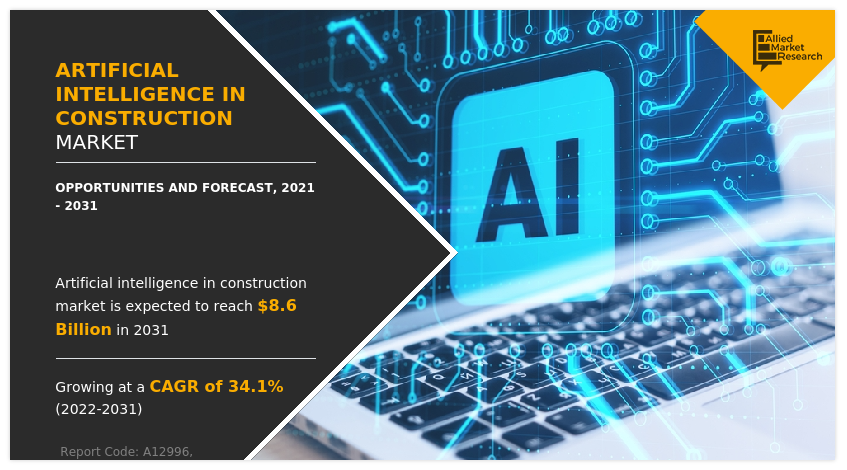
One of the biggest barriers to artificial intelligence in construction market size is considered to be a shortage of competent personnel. The work that needs to be done in the construction industry with the aid of artificial intelligence requires both technical and domain knowledge to produce the desired results. If the worker does not have a solid understanding of it, the entire project prediction and off-site construction work fails, which can result in a significant loss for the business and subject the business to a number of project-related challenges to hinder the market's growth.
The industry players are investing a lot of effort in the research & development of smart and unique strategies to sustain their growth in the AI in construction market. These strategies include product launches, mergers & acquisitions, collaborations, partnerships, and refurbishing of existing technology. In April 2022, to speed up the rollout of fiber optic in the nation, Deepomatic, the industry leader in visual automation for telecommunications, announced a partnership with Polish system integrator VECTOR SOLUTIONS to offer its AI-powered image recognition solution to all telecom operators in Poland. Poland has prioritized fiber deployment since updating its National Internet Plan in 2020 to meet the Gigabit Society goals, which call for 100% of households to have access to broadband speeds of at least 100 Mbps by 2025, with the option to upgrade to gigabit speeds.
The key players profiled in this report include Autodesk Inc, Microsoft Corporation, IBM Corporation, SAP SE, Oracle Corporation, Aurora Computer Services, Building System Planning INC., PTC Inc., NVIDIA Corporation, and Dassault Systemes SE.
The global artificial intelligence in construction market forecast is segmented on the basis of offerings, deployment type, organization size, industry type, and region. By offerings, the market is sub-segmented into solutions and services. By deployment type, the market is classified into cloud and on-premises. By organization size, the market is classified into small & medium-sized enterprises (SMEs), and large enterprises. By industry type, residential, institutional commercials, and others. By region, the market is analyzed across North America, Europe, Asia-Pacific, and LAMEA.
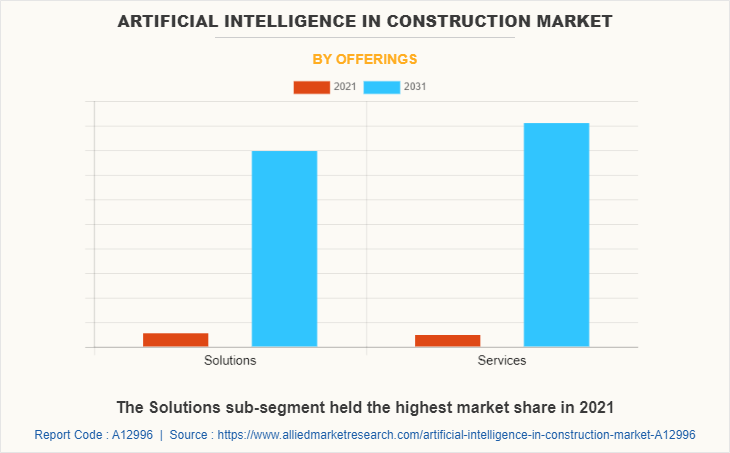
By offerings, the solutions sub-segment dominated the market in 2021. The market's increasing development, creativity, and accessibility of AI-based construction activity solutions are mostly responsible for the expansion. Building and construction firms are using AI technology more frequently to complete various construction tasks. Artificial intelligence solutions offer significant applications for the construction industry, such as supply chain management, project planning, schedule management, and risk management. AI technologies are increasing the efficiency of the construction process. These are predicted to be the major factors propelling artificial intelligence in construction market size during the forecast period.
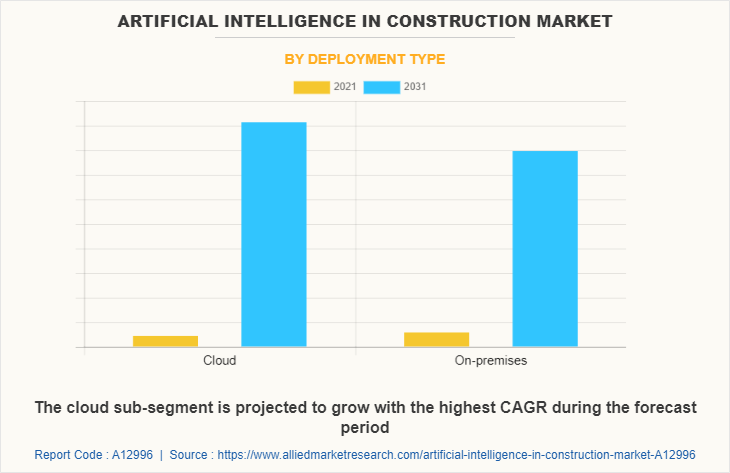
By deployment type, the cloud sub-segment has shown the fastest growth during the forecast period. Applications can easily and affordably use the cloud as a deployment option. Flexibility, disaster recovery, automatic software upgrades, capital expense-free, greater collaboration, work from anywhere, document management, security, competitiveness, and environmental friendliness are a few of the major advantages of using the cloud. Additionally, investors are funding the development of computer-aided virtual environments to give clients, designers, and constructors a virtual experience of a building. These are predicted to be the major factors positively driving the growth of the cloud sub-segment in the market.
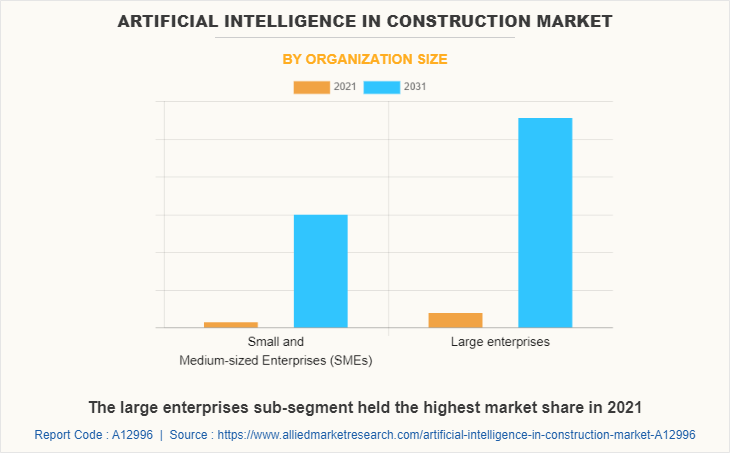
By organization size, the large enterprise sub-segment dominated the AI in construction market in 2021. This growth is majorly attributed to the large enterprise or businesses that are spending huge amounts in bringing advanced technologies such as artificial intelligence in the construction sector. For instance, Procore Technologies is one of the large enterprises in artificial intelligence offering artificial intelligence-enabled solutions to support workers. Business intelligence is created from project data by Procore Technologies. This company offers historical analysis for better predictions and uses machine learning to extract trends from larger datasets and find patterns. Customers can use the industry-sourced templates or create their own bespoke reports to benefit from strong data visualization. Furthermore, clients of Procore can combine and save data from various platforms, which finally enables customers to take charge of their financial situation owing to AI-powered solutions. These are predicted to be the major factors driving market opportunities during the forecast period.
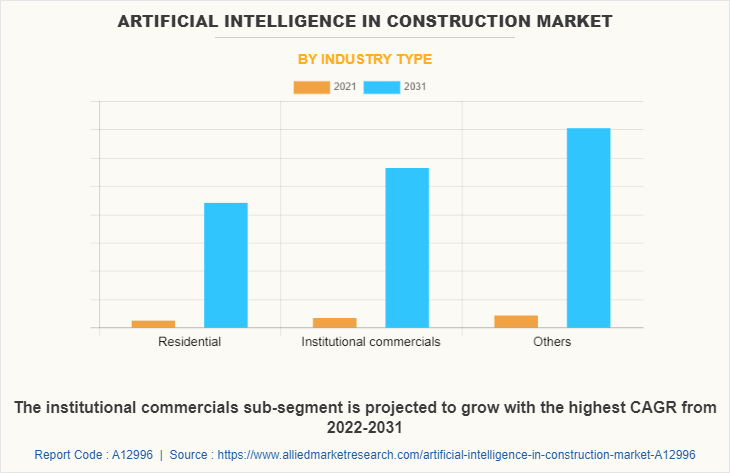
By industry type, the institutional commercials sub-segment is estimated to show the fastest growth during the forecast period. Buildings such as stadiums, schools, hospitals, malls, libraries, art galleries, and museums are examples of constructions that fall under the category of institutional and commercial construction. Compared to residential buildings, these structures are governed by more stringent laws. Additionally, they must be adaptable enough to adapt to the growing customer requirements for the development of advanced technologies. These factors are anticipated to boost the growth of the large enterprise sub-segment during the analysis timeframe.
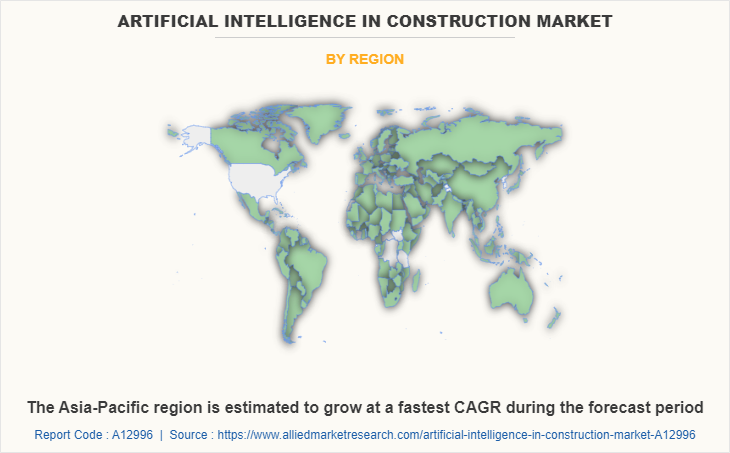
By region, North America dominated the global market in 2021 and is projected to remain the fastest-growing sub-segment during the forecast period. The region's advanced technological infrastructure and the widespread presence of major AI in construction industry participants is estimated to boost market demand. For instance, IBM Corporation, Red Hat Software, and Cobuilder announced a global partnership in April 2021 to jointly develop a new platform that is intended to assist in tying together the dispersed supply chain of the building sector. The platform, known as OpenBuilt, is anticipated to provide a cutting-edge digital solution to assist the upcoming building projects for the development of safer, sustainable, and effective technologies. These factors are anticipated to boost the AI in construction industry growth.
Impact of COVID-19 on the Industry
- The complete lockdown, stringent regulations, and social distancing norms imposed due to the COVID-19 pandemic have led to the complete shutdown of construction activities, All the industrial, as well as commercial sectors, were closed. These factors have negatively impacted the growth of market owing to the fear of virus spread.
- Significant reduction in the cash flows due to the closure of various construction and operational activities, has led to the stoppage of construction activities. These factors have impacted the AI in construction market growth.
- To prevent the spread of the COVID-19 pandemic, a number of businesses and industries have opted for work-from-home models. This has reduced the demand for office space and raised costs, which has reduced the opportunities for the construction industry.
- Economic slowdown has affected the setup of new artificial intelligence in construction projects across the world as the majority of government funding was diverted toward the healthcare sector to save the lives of people.
Key Benefits for Stakeholders
- This report provides a quantitative analysis of the market segments, current trends, estimations, and dynamics of the artificial intelligence in construction market analysis from 2021 to 2031 to identify the prevailing artificial intelligence in construction market opportunities.
- The market research is offered along with information related to key drivers, restraints, and opportunities.
- Porter's five forces analysis highlights the potency of buyers and suppliers to enable stakeholders make profit-oriented business decisions and strengthen their supplier-buyer network.
- In-depth analysis of the market segmentation assists to determine the prevailing market opportunities.
- Major countries in each region are mapped according to their revenue contribution to the global market.
- Market player positioning facilitates benchmarking and provides a clear understanding of the present position of the market players.
- The report includes the analysis of the regional as well as global artificial intelligence in construction market trends, key players, market segments, application areas, and market growth strategies.
Artificial Intelligence in Construction Market Report Highlights
| Aspects | Details |
| Market Size By 2031 | USD 8.6 billion |
| Growth Rate | CAGR of 34.1% |
| Forecast period | 2021 - 2031 |
| Report Pages | 280 |
| By Offerings |
|
| By Deployment Type |
|
| By Organization Size |
|
| By Industry Type |
|
| By Region |
|
| Key Market Players | NVIDIA Corporation, Autodesk, Inc., Microsoft Corporation, Dassault Systemes SE, Oracle Corporation, SAP, aurora computer services, Building System Planning Inc., IBM, PTC Inc. |
Analyst Review
Rapid increase in the adoption of artificial intelligence in construction sector as it facilitates real-time interaction with workers, machines, and objects is estimated to boost the AI in construction market demand. An increase in demand for AI platforms and solutions, as it offers safety, facilitates project planning, and makes job sites more productive is a major growth driving factor. Artificial intelligence (AI) in construction can make job sites more productive. This is because the use of AI in construction can minimize repetitive tasks thereby reducing human efforts and facilitating precise operations. Also, AI helps in enhancing safety in the construction sector, as AI can track job sites and can scan them for safety hazards. AI can keep a track of workers who are not wearing protective equipment which helps to avoid on-site accidents. AI can effectively help in dealing with labor shortages by planning the distribution of machinery and labor across various construction sites. The use of AI in robots can boost off-site construction activities, as these robots can combine the components of a building together.
Among the analyzed regions, North America is expected to account for the highest revenue in the market by the end of 2031, followed by Asia-Pacific, North America, and LAMEA. High purchasing power, ongoing investments in automation, and government-sponsored initiatives in artificial intelligence in the construction industry are the key factors responsible for the leading positions of North America and Asia-Pacific in the global artificial intelligence in construction market.
The global artificial intelligence in construction market was valued at $496.4 million in 2021, and is projected to reach $8.6 billion by 2031
The artificial intelligence in construction market is projected to grow at a compound annual growth rate of 34.1% from 2022 to 2031.
Autodesk Inc, Microsoft Corporation, IBM Corporation, SAP SE are some of the major companies in the artificial intelligence in construction market.
Asia-Pacific will provide more business opportunities for global artificial intelligence in construction market in the future.
Artificial intelligence in construction facilitates the better design of buildings through generative design. Artificial intelligence (AI) in construction can help in risk mitigation in terms of time, quality, safety, and cost. AI can make job sites more productive, enhances construction safety, as well as it can address labor shortages. These are the major factors that will generate excellent growth opportunities in the market.
Loading Table Of Content...



